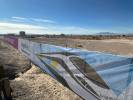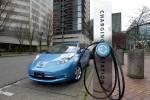EDITORIAL: Electric crazy carnival
Nevada is about to become a proving ground for the range, practicality and rural tourism impact of electric cars — at your expense, of course.
Considering the state is providing electric car maker Tesla with more than $1 billion in tax breaks to build a battery plant east of Reno, it makes perfect sense for Nevada to create one of the country’s first rural charging station networks. But the initiative, announced Tuesday by Gov. Brian Sandoval and NV Energy officials, also highlights the electric car industry’s dependence on taxpayers to make the vehicles useful and affordable.
The plan is to place charging stations in towns along U.S. Highway 95, to allow electric cars to travel between the Las Vegas and Reno population centers by the end of the year. Electric cars lack the range to travel the more than 400 miles between the cities on a single charge. So NV Energy and the Governor’s Office of Energy will split the cost of installing charging stations that will allow electric car owners to “gas up” their batteries and, perhaps, spend a little time and money in the communities where the stations are placed.
As reported by the Review-Journal’s Sandra Chereb, officials are searching for suitable locations in Indian Springs, Tonopah, Fallon and Hawthorne. Each station would have one fast-charging connection, which can completely charge a typical vehicle battery in less than an hour, and two slower-charging connections that will require drivers to wait hours for a full charge.
If three charging connections at each station seems like too few, consider that there are just 1,400 electric cars registered in the state, according to Marie Steele, manager of NV Energy’s electric vehicles and renewable energy program, and they continue to comprise a tiny share of total vehicle sales. At the Carson City Community Center, where Tuesday’s news conference was held, two charging stations installed last year serve just 10 cars a week.
State grants (taxpayers) and NV Energy (ratepayers) will pay for the rural charging stations. And electric car owners, who enjoy generous federal income tax credits for purchasing the vehicles and don’t pay the fuel taxes that fund road construction and maintenance, won’t have to pay for the power they use at the rural charging stations, at least for an initial period. Although the cost of a single vehicle battery charge is quite small, at some point, shouldn’t we expect electric vehicle owners to pay for something?
If it were possible to make money off the installation of electric vehicle charging stations, entrepreneurs would be building them all over the place. That a highly profitable power monopoly such as NV Energy won’t fund them without taxpayer subsidies says everything about the business viability of charging stations — and why the electric car industry still can’t stand on its own two feet.
That said, it will be interesting to see how many electric car owners are willing to turn the seven- to eight-hour trip between Las Vegas and Reno into a 10- to 12-hour trip — or even a two-day adventure — and whether rural businesses get any benefit from the charging stations.
Whatever happens, making Nevada green still requires lots of your green.























